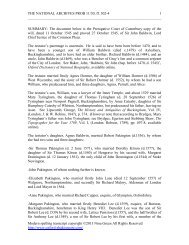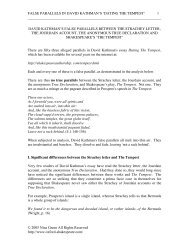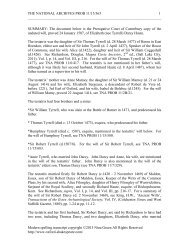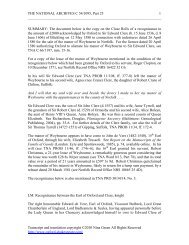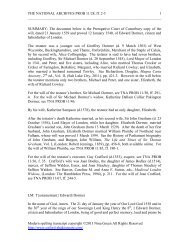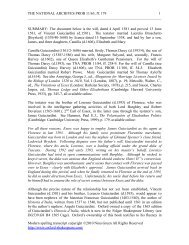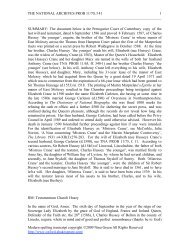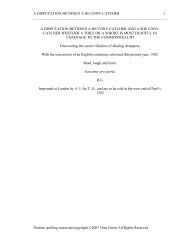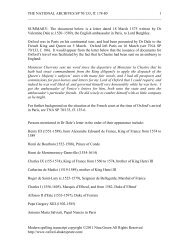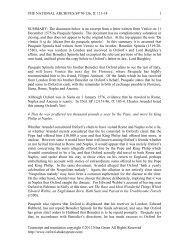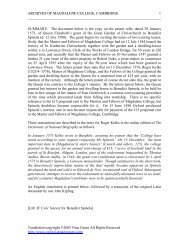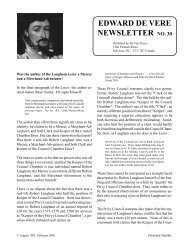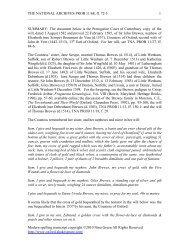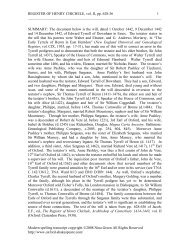ARCHIVO GENERAL DE SIMANCAS Leg. 835, ff. 121-4 1 T
ARCHIVO GENERAL DE SIMANCAS Leg. 835, ff. 121-4 1 T
ARCHIVO GENERAL DE SIMANCAS Leg. 835, ff. 121-4 1 T
You also want an ePaper? Increase the reach of your titles
YUMPU automatically turns print PDFs into web optimized ePapers that Google loves.
<strong>ARCHIVO</strong> <strong>GENERAL</strong> <strong>DE</strong> <strong>SIMANCAS</strong> <strong>Leg</strong>. <strong>835</strong>, <strong>ff</strong>. <strong>121</strong>-4 1<br />
________________________________________________________________________<br />
SUMMARY: This letter dated 25 December 1581 from the Spanish ambassador in<br />
London, Don Bernardino de Mendoza (d.1604), to King Philip of Spain, although written<br />
a year to the day after the event, provides evidence of Howard and Arundel’s actions on<br />
the night of 25 December 1580. Mendoza begins by stating his knowledge ‘through<br />
some priests’ that Oxford’ first cousin, Lord Henry Howard, had been reconciled to the<br />
Catholic church and had been a practising Catholic ‘for some years’ prior to 1581 and<br />
that for this reason Howard had strongly favoured the prospective marriage between<br />
Queen Elizabeth and Alencon. Mendoza then turns to the events of the night of 25<br />
December 1580, stating that Howard ‘heard’ that Oxford had accused him of being<br />
reconciled to the Catholic Church and that the Queen had secretly ordered his (Howard’s)<br />
arrest. This version conflicts with Charles Arundel’s account of his meeting with Oxford<br />
earlier that evening in which Arundel states that Oxford warned him, and told him that<br />
‘Southwell hath bewrayed all’ (see TNA SP 15/27A/46, <strong>ff</strong>. 81-2). In assessing he<br />
validity of the two di<strong>ff</strong>erent versions, it is noteworthy that Southwell did not flee to<br />
Mendoza’s house with Howard and Arundel on the night of 25 December 1580, which<br />
suggests that some credence is to be placed in Charles Arundel’s statement that Oxford<br />
told him that ‘Southwell hath bewrayed all’. Moreover in this letter Mendoza states that<br />
Howard and Arundel told him ‘that they had been warned of their danger by a Councillor,<br />
a friend of Lord Harry’s’, whereas, as mentioned above, in his account of his meeting<br />
with Oxford Charles Arundel states that it was Oxford who warned him.<br />
It seems likely that someone deliberately arranged that Howard and Arundel be provided<br />
with disinformation, knowing that Howard’s guilty conscience about his contact with the<br />
French ambassador Mauvissiere would provoke him into doing something rash for which<br />
he could legitimately be arrested, and this is precisely what happened. As Mendoza’s<br />
letter indicates, Howard admitted to Mendoza that his concern that his contact with<br />
Mauvissiere would be revealed, and that he would for that reason be thrown into the<br />
Tower and lose his life, prompted him to flee to Mendoza’s house where he and Arundel<br />
were taken in and sheltered until they received word that they would not be imprisoned in<br />
the Tower but only confined to the houses of ‘gentlemen’. As Mendoza relates, upon<br />
being given this assurance, Howard and Arundel then left Mendoza’s house. However<br />
once Howard and Arundel were under arrest, Leicester spread rumours to inflame people<br />
against them, and against the French, as Mendoza had stated in his letter of 9 January<br />
1581.<br />
Mendoza thus reveals, from Howard’s own mouth, his complicity with Mauvissiere and<br />
his fear for his life, which in turn sheds light on the charade which Oxford and the Queen<br />
subsequently acted at court for Mauvissiere’s benefit on January 10 or 11, and which<br />
Mauvissiere reported to King Henri III of France in his letter of 11 January 1581 (see BN<br />
15973, <strong>ff</strong>. 387v-392). It seems very likely that the performance put on by Oxford and the<br />
Queen, and the Queen’s remarks to Mauvissiere, were designed to elicit incriminating<br />
statements from Mauvissiere against himself and Howard while at the same time o<strong>ff</strong>ering<br />
reassurance that the French marriage negotiations would not be jeopardized by these<br />
‘plots’.<br />
Transcript ©2009 Nina Green All Rights Reserved<br />
http://www.oxford-shakespeare.com/
<strong>ARCHIVO</strong> <strong>GENERAL</strong> <strong>DE</strong> <strong>SIMANCAS</strong> <strong>Leg</strong>. <strong>835</strong>, <strong>ff</strong>. <strong>121</strong>-4 2<br />
________________________________________________________________________<br />
Near the end of this part of the letter, Mendoza states that ‘El Milord Hari, en<br />
agradescimiento de la voluntad con que yo le acogí, no podria decir á V.M. con el<br />
cuidado que me ha advertido y advierte de cuanto puede alcanzar que es del servicio de<br />
V. M.’. In the first translation below, this is rendered as ‘In his gratitude for my kindness<br />
in sheltering him, Lord Harry has expressed to me most emphatically that all that he has<br />
is at your Majesty’s service’. In the second, it is rendered as ‘Milord Harry, in gratitude<br />
for the goodwill with which I received him, and with a care which I can hardly describe,<br />
has informed and informs me of everything he hears which is of service to your Majesty’.<br />
There is a vast di<strong>ff</strong>erence between the two translations, and the second seems to reflect<br />
Mendoza’s words more accurately. It thus seems that Howard acted as a spy for Spain<br />
from 25 December 1580 onwards. We have it on Mendoza’s own evidence that after the<br />
events of the night of 25 December 1580 Howard became Mendoza’s constant and<br />
trusted informant, and that Howard’s information was of particular value because of his<br />
friendship with the ladies of Queen Elizabeth’s privy chamber and his kinsman, the Earl<br />
of Sussex, and in fact much of the information in the letter so clearly depends on sources<br />
such as Sussex and the ladies of the Queen’s privy chamber that it can only have reached<br />
Mendoza through Lord Henry Howard. Mendoza concludes by a<strong>ff</strong>irming to King Philip<br />
that Howard is so eager to help him that he could not so much as wish Howard to help<br />
him more.<br />
It should be noted that in the original Spanish Mendoza mistakenly wrote ‘francés<br />
Arundel’, thereby conflating Francis Southwell and Charles Arundel. It was Charles<br />
Arundel who fled with Lord Henry Howard to Mendoza’s house on the night of 25<br />
December 1580.<br />
The transcript in Spanish below of the portion of the letter dealing with Lord Henry<br />
Howard is taken from Coleccion de Documentos Ineditos para la Historia de España por<br />
El Marques de la Fuensanta del Valle, D. José Sancho Rayon y D. Francisco de<br />
Zabalburu, Tomo XCII (Madrid: M. Ginesta Hermanos, Impresores de la Real Casa,<br />
1888, reprinted Kraus Reprint Ltd., Vadux, 1966), pp. 216-221. The first translation<br />
below, of the entire letter, is taken from Hume, Martin, ed., Calendar of Letters and State<br />
Papers relating to English A<strong>ff</strong>airs, Vol. III, 1580-1586, pp. 242-6. The second<br />
translation below, of the portion of the letter dealing with Lord Henry Howard only, is<br />
taken from Pollen, John Hungerford, and William MacMahon (eds.) (1919), The<br />
Venerable Philip Howard Earl of Arundel, 1557-95, Catholic Record Society, vol. 21, pp.<br />
30-1.<br />
Milord Harihabart, hermano del Duque de Norfolch ha años que yo sé por via de clérigos<br />
ser muy católico, haciendo de ordinario, despues que se reconcilió á la Santa Iglesia, el<br />
ejercicio como tal, y por este respecto deseaba se efectuase el casamiento, creyendo como<br />
otros muchos católicos que por este medio vinieran á tener libremente la Religion, y<br />
entendiendo que el Conde de Asfor le habia acusado y á un francés Arundel de haberse<br />
reconciliado á la Santa Iglesia Romana, por lo cual habia mandado la Reina en secreto los<br />
prendiesen otro dia, de que fueron advertidos por un Consejero amigo de Milord Hari, y<br />
Transcript ©2009 Nina Green All Rights Reserved<br />
http://www.oxford-shakespeare.com/
<strong>ARCHIVO</strong> <strong>GENERAL</strong> <strong>DE</strong> <strong>SIMANCAS</strong> <strong>Leg</strong>. <strong>835</strong>, <strong>ff</strong>. <strong>121</strong>-4 3<br />
________________________________________________________________________<br />
tras tener estrecha comunicacion con el Embajador de Francia y temer no los metiesen en<br />
la Torre, perdiendo sus vidas, no osaron en aquella conyuntura fiarse dél ni ir á su casa,<br />
viniéndose á las doce de la noche á la mia sin haberles hablado jamás; me dijeron la<br />
necesidad en que se hallaban de perder las vidas sino les escondia; yo por ser católicos<br />
los entretuve sin que persona de mi casa lo entendiese, sino un solo criado, hasta en tanto<br />
que su amigo el Consejero los avisó que su prision no sería sino en casa de un caballero,<br />
por cuyo respecto salieron luégo en público. El Milord Hari, en agradescimiento de la<br />
voluntad con que yo le acogí, no podria decir á V.M. con el cuidado que me ha advertido<br />
y advierte de cuanto puede alcanzar que es del servicio de V. M. reconociendo la buena<br />
obra que no es pequeña novedad hacello inglés. Tiene muy beunas partes y<br />
entendimiento y mucha amistad con damas de la Cámara privada, que le advierten<br />
puntualmento cuanto pasa de puertas á dentro y con el de Sussex, que es uña y carne, y<br />
por tocar con cuanta aficion trata de ocuparse en el servicio de V. M., que ha sido<br />
siempre su deseo, es ocasion representarlo yo aquí á V. M., cosa que de ninguna manera<br />
quiere que entienda aún su propio brazo por asistirme mejor.<br />
From Hume, Martin, ed., Calendar of Letters and State Papers relating to English<br />
A<strong>ff</strong>airs, Vol. III, 1580-1586, pp. 242-6:<br />
On the 19 th and 20 th the barges were ready for Alencon's departure, some of the<br />
Frenchmen and the baggage having already started. The supper for the Queen and him<br />
was all prepared at Cobham, when a strong north-east gale sprang up, and has been<br />
blowing ever since. This being against the crossing, he has been delayed, and in the<br />
meanwhile letters came to him from France, about which he has conferred with the<br />
Queen, who had been anxious to expedite his departure in view of Flemish a<strong>ff</strong>airs.<br />
Although she displayed grief publicly at his departure, I understand that in her own<br />
chamber she danced for very joy at getting rid of him, as she desired of all things to get<br />
him away from here.<br />
Whilst he was being detained by contrary weather he told the Queen that he could not<br />
help feeling hurt that she had been so ready to let him go, knowing as she must how<br />
much he was attached to her, but he could see by this how luke-warm was her love for<br />
him, and that his presence tired her, since she was ready to send him away rather in<br />
public disgrace than private satisfaction. The Queen with a hundred thousand false words<br />
and oaths assured him of her a<strong>ff</strong>ection for him, and said that she had only been brought to<br />
allow his departure in order to give him pleasure, and not for her own gratification, since<br />
his departure was unnecessarily hasty. Alencon replied to this, ‘No, no, Madam, you are<br />
mine, as I can prove by letters and words you have written to me, confirmed by the gift of<br />
the ring, of which I have sent intelligence to the King my brother, my mother, and the<br />
Princes of France, all those who were present at our interviews being ready to bear<br />
testimony. If I cannot get you for my wife by fair means and a<strong>ff</strong>ection I must do so by<br />
force, for I will not leave this country without you.’ The Queen was perturbed at these<br />
words, and replied that she had never written anything that she could not justify, and she<br />
did not care what interpretation people chose to put upon her letters as she knew her own<br />
intention better than anyone else could, and as for the ring, it was only a pledge of<br />
Transcript ©2009 Nina Green All Rights Reserved<br />
http://www.oxford-shakespeare.com/
<strong>ARCHIVO</strong> <strong>GENERAL</strong> <strong>DE</strong> <strong>SIMANCAS</strong> <strong>Leg</strong>. <strong>835</strong>, <strong>ff</strong>. <strong>121</strong>-4 4<br />
________________________________________________________________________<br />
perpetual friendship and of a conditional contract, dependent upon his brother the King<br />
acceding to her conditions, which she was quite sure he never would do. She protested,<br />
finally, that she was entirely free from any matrimonial engagements, and, on the<br />
contrary, was desirous of remaining in her present state, until she could at all events<br />
overcome her natural hatred to marriage, but she assured him, notwithstanding this, that<br />
there was nothing that she desired more than that he should stay in this country as her<br />
brother and friend, for mutual good companionship, but not as her husband. Many words<br />
passed about this, the end of which was that after the holidays they would discuss what<br />
money should be given to him.<br />
As the Queen saw this unexpected change in Alencon, and at the same time received<br />
news from the Ambassador Cobham that the King of France would not be sorry for his<br />
brother to be delayed here, she called the Lord Treasurer and repeated to him what had<br />
passed, directing him to endeavour, with the greatest discretion and moderation, to<br />
represent to Alencon how important his presence was in Flanders, and how evident was<br />
the danger that they (the States) would submit to your Majesty unless he were there to<br />
prevent it. Cecil, by this means, was to urge him to depart, whilst she undertook to feed<br />
him with hopes that he should take some money with him.<br />
When the Queen had done this, she sent secretly for Simier, who apparently for a long<br />
time she has had in her interest, and had been entertaining here. To him she complained<br />
greatly of the annoyance she felt at Alencon's pressing her so closely, saying that she<br />
could not get rid of him without danger, or entertain him further without inconvenience.<br />
Simier advised her that if she was not willing to marry, she should stand firm in the<br />
conditions which she was demanding from the King of France, and that she should insist<br />
upon their being granted before the settlement of the marriage. The Queen repeated to<br />
him the conditions she had proposed, (which I have already written to your Majesty), and<br />
said that it was not to be imagined that the King would consent to declare war against<br />
your Majesty, unless she undertook to contribute to the cost. This would give her an<br />
excuse to publicly negotiate for a confirmation of her old alliance with the House of<br />
Burgundy, whereupon she doubted not that the King would break o<strong>ff</strong> the negotiations,<br />
and recall Alencon.<br />
Simier replied that she must not depend upon this, because the King of France well knew<br />
the evil inclination of his brother, his inconstancy in religion, and his readiness to<br />
encourage faction, and he might well grant her terms in order to get rid of his brother out<br />
of the country, and set him free to encourage sedition elsewhere rather than in France,<br />
and thus put a stop to the civil war which England had kept alive for so many years.<br />
The Queen replied, ‘Do not think that the King will grant these terms, but even if he do, I<br />
shall find a road out of it. You may see how Alencon loves me by a very good thing I<br />
will tell you in strict secrecy. On the 22 nd , he asked me at least to let him have some<br />
money to maintain the war in Flanders, which he said he had begun for my sake, and that<br />
I should thus recompense him for the a<strong>ff</strong>ront of my refusing to marry him. As I found no<br />
other convenient way of getting rid of him, I o<strong>ff</strong>ered him a considerable sum per month,<br />
the first payment of which I promised to assure at once. This has so much brightened<br />
Transcript ©2009 Nina Green All Rights Reserved<br />
http://www.oxford-shakespeare.com/
<strong>ARCHIVO</strong> <strong>GENERAL</strong> <strong>DE</strong> <strong>SIMANCAS</strong> <strong>Leg</strong>. <strong>835</strong>, <strong>ff</strong>. <strong>121</strong>-4 5<br />
________________________________________________________________________<br />
him up that you would not know him, if you saw him, but as soon as he is across the sea,<br />
I will assure him that my Council will not agree to the arrangement, on the ground that<br />
my country cannot, without unduly weakening itself, contribute so large a sum and the<br />
people would not allow it.’<br />
This was the more evident as it might be inferred that Alencon's object in getting so much<br />
treasure from England was to reduce the country to impotence (this being one of the<br />
reasons which were set forth in the Council when Alencon arrived) and that there was no<br />
better way for Alencon to attenuate the strength of England than to get money under<br />
cover of its being to the advantage of this country to maintain the war in the Netherlands.<br />
She said that money was the sinew of warfare, for it was certain, as the world went now,<br />
that no one need want soldiers who had money to pay for them. Cecil is of opinion,<br />
therefore, that if any money is given to Alencon it should be very little, and that the<br />
Queen should not divest herself of what she has. She dwelt at length with Simier on the<br />
point, and the colloquy ended with great merriment as they said that Alencon was a fine<br />
gallant to sell his lady for money.<br />
I am informed that since the return of Beale from the Queen of Scotland with his report<br />
of her good reception of him, the Queen discussed the matter with Alencon, complaining<br />
of the Guises, of whom Alencon used the most shameful and dishonourable language, so<br />
much so that the Queen showed him a letter she had written to his brother the King,<br />
complaining of them (the Guises) in the most vituperative and abusive words. Alencon<br />
wanted the Queen to moderate it somewhat, in order that the Guises might not think that<br />
he had incited her to write thus, but he did not dare to press the matter upon her, for fear<br />
that she might think that his own expressions were feigned. And so the letter was sent to<br />
the King.<br />
Alencon has been pressing the Queen greatly to send Simier away, but she has excused<br />
herself by saying that it was not well to expel any one from the country, especially a<br />
stranger who had come hither to justify himself with regard to his behaviour in the<br />
marriage negotiations, which she could testify he had managed better than anyone else.<br />
Alencon had thereupon sent to tell Simier that, if he considered himself still in his<br />
service, he must instantly leave England. Simier replied that, although he had been his<br />
servant, he was not so now, and that until he had given a good account of himself, and all<br />
the world had acknowledged that he was innocent of the charges made against him, he<br />
would not budge from the country, whereupon Alencon became more angry than before,<br />
and again pressed the Queen to expel him.<br />
The Treasurer continues his e<strong>ff</strong>orts to expedite Alencon's departure, and I understand<br />
that, as another reason for hastening him, they have represented how expensive it will be<br />
for him to stay here over New Year's Day, by reason of the presents he will have to give,<br />
according to the custom of the country. I cannot say, however, precisely, the day that he<br />
will leave, as it depends upon the instability of the Queen and Alencon, nor can I assert<br />
whether his going to Flanders will be carried through, but it is quite evident that all<br />
Englishmen were greatly rejoiced at seeing him ready to go, and they brought the ships to<br />
the mouth of the river to take him over, almost dead against the wind.<br />
Transcript ©2009 Nina Green All Rights Reserved<br />
http://www.oxford-shakespeare.com/
<strong>ARCHIVO</strong> <strong>GENERAL</strong> <strong>DE</strong> <strong>SIMANCAS</strong> <strong>Leg</strong>. <strong>835</strong>, <strong>ff</strong>. <strong>121</strong>-4 6<br />
________________________________________________________________________<br />
Lord Harry Howard, the brother of the Duke of Norfolk, I have known by repute for<br />
years past, by means of priests, as a good Catholic, who, since his reconciliation with the<br />
Church, has performed all his duties as such. He was therefore desirous of bringing<br />
about the marriage, as he believed, like many others, that it would result in their being<br />
allowed freedom for their faith. On hearing that the Earl of Oxford (Hertford?) had<br />
accused him and Francis Arundel of submitting to the Roman Church, and that the Queen<br />
had ordered them both secretly to be arrested, they came to my house at midnight,<br />
although I had never spoken to them, and told me that they had been warned of their<br />
danger by a Councillor, a friend of Lord Harry’s. They had been in close communication<br />
with the French ambassador, but they did not dare to trust him at this juncture, and feared<br />
that they would be taken to the Tower and their lives be sacrificed. They therefore came<br />
to me in their peril, and asked me to hide them and save their lives. As they were<br />
Catholics, I detained them without anyone in the house knowing of it, excepting one<br />
servant, until their friend the Councillor informed them that they would only be placed<br />
under arrest in a gentleman’s house, whereupon they immediately showed themselves in<br />
public. In his gratitude for my kindness in sheltering him, Lord Harry has expressed to<br />
me most emphatically that all that he has is at your Majesty’s service, thus showing his<br />
acknowledgment for the favour I did him, which is no small novelty for an Englishman to<br />
do. He has very good parts and understanding, and is friendly with the ladies of the privy<br />
chamber, who tell him exactly what passes indoors. He is extremely intimate also with<br />
Sussex, and as he is so pressing in his desire to serve your Majesty, I have thought fit to<br />
represent it to you. London, 25 th December 1581.<br />
From Pollen, John Hungerford, and William MacMahon (eds.) (1919), The Venerable<br />
Philip Howard Earl of Arundel, 1557-95, Catholic Record Society, vol. 21, pp. 30-1:<br />
Milord Henry Howard, brother of the Duke of Norfolk, has for some years, as I know<br />
through some priests, been very Catholic, practising generally, since his reconciliation to<br />
Holy Church, his duties as such. For this reason he desired that the match [with Alencon]<br />
should take place, believing like many other Catholics that by this means they would<br />
come to hold their religion in freedom. Then he heard that the Earl of Oxford had<br />
accused him and one Francis Arundel of being reconciled to the Holy Roman Church.<br />
For this the Queen had given secret order the other day for his arrest, and they were<br />
advised of this by a Councillor, a friend of milord Harry. What with their close<br />
correspondence with the ambassador of France, and their fears of being committed to the<br />
Tower, and so losing their lives, they did not dare at this juncture to trust him, nor to go<br />
to their home; but coming to my house at 12 in the night, though I had never spoken to<br />
them, they told me the danger in which they found themselves of losing their lives unless<br />
I would hide them. As they were Catholics, I so entertained them that no-one in my<br />
house knew it except one of my men, until their friend the Councillor gave them notice<br />
that they would be confined in the house of a gentleman only, and in view of that, they<br />
immediately showed themselves in public. Milord Harry, in gratitude for the goodwill<br />
with which I received him, and with a care which I can hardly describe, has informed and<br />
Transcript ©2009 Nina Green All Rights Reserved<br />
http://www.oxford-shakespeare.com/
<strong>ARCHIVO</strong> <strong>GENERAL</strong> <strong>DE</strong> <strong>SIMANCAS</strong> <strong>Leg</strong>. <strong>835</strong>, <strong>ff</strong>. <strong>121</strong>-4 7<br />
________________________________________________________________________<br />
informs me of everything he hears which is of service to your Majesty, and recognizes<br />
my favour, no little novelty for an Englishman to do. He has very good qualities and<br />
intelligence, and much friendship with the ladies of the privy chamber, who inform him<br />
exactly what passes indoors. He is also as intimate with the Earl of Sussex as nail with<br />
quick. To touch of the greatness of the a<strong>ff</strong>ection with which he occupies himself in the<br />
service of your Majesty (which is his constant desire) -- I may here say that in no wise<br />
would I wish him even to [extend] his arm to help me more.<br />
Transcript ©2009 Nina Green All Rights Reserved<br />
http://www.oxford-shakespeare.com/



